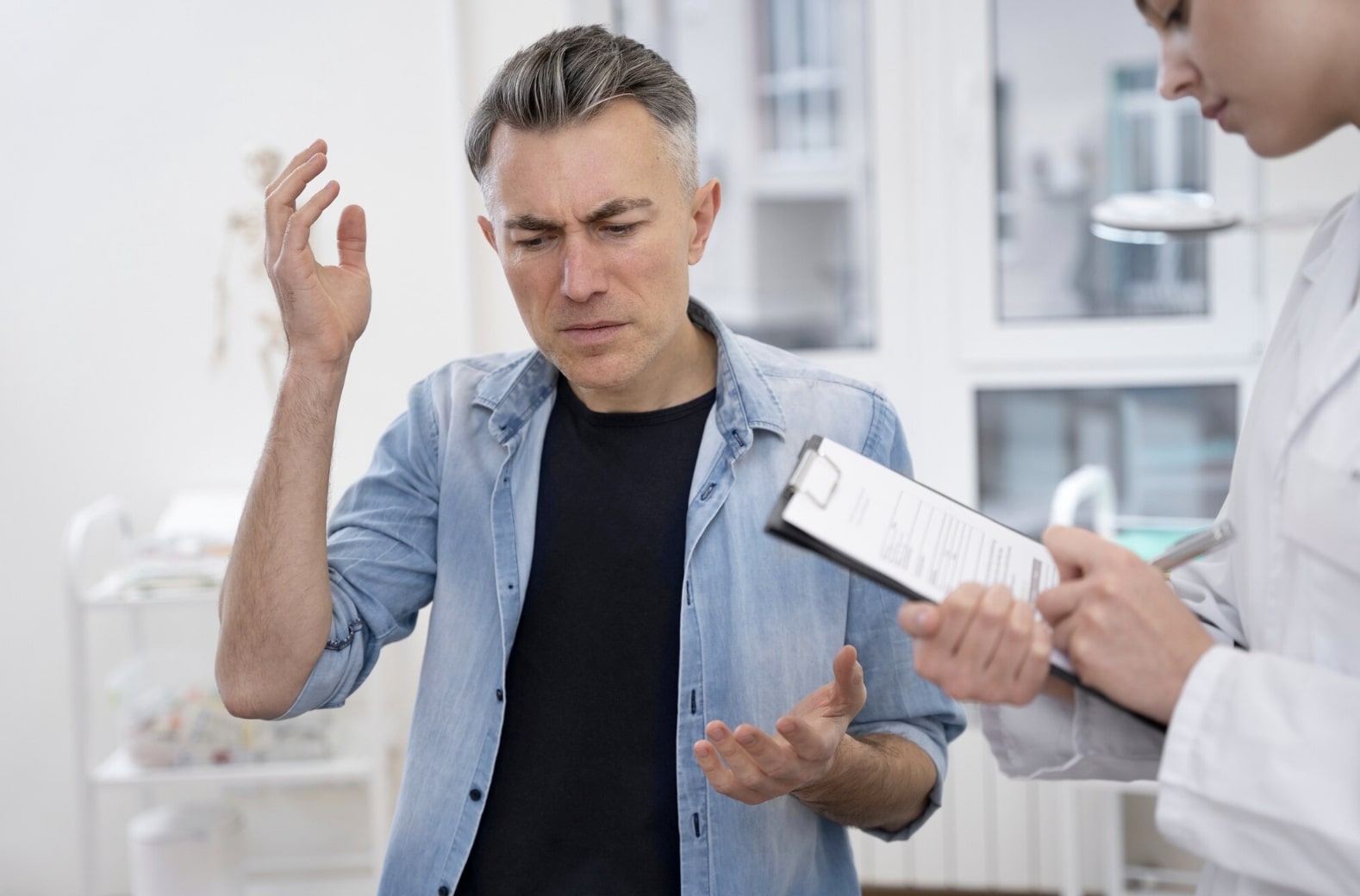In recent years, pre-workout supplements have seen a significant boost in popularity among men who want to maximize their time at the gym. Whether you’re pushing for new strength records, training for endurance, or simply trying to boost energy levels after a long day, many men use a scoop of pre-workout supplements as a catch-all solution. But while these supplements promise sharper focus and stronger performance, many wonder if using pre-workout supplements could have a negative effect on sexual health.
Erectile dysfunction (ED) is a common concern for men, and research suggests it may affect between 30 and 50 million men in the US and hundreds of million worldwide. (1) For men concerned about ED, anything that might impact blood flow, hormone balance, or overall performance in the bedroom deserves a closer look.
In this guide, we’ll break down what pre-workout supplements really do, how their ingredients affect the body, and whether science supports a connection between these supplements and erectile dysfunction.
What Are Pre-Workout Supplements?
Pre-workout supplements are designed to give athletes and gym-goers alike extra energy, sharper focus, and increased stamina. They often come in flavored powders that you mix with water, though capsule and ready-to-drink forms are also available.
Some of the most common ingredients of pre-workout supplements include:
- Caffeine: To increase alertness and can improve workout intensity.
- Creatine: To support muscle energy production and recovery.
- Beta-alanine: Helps buffer muscle fatigue, allowing for longer workouts.
- Nitric oxide boosters (like L-arginine or L-citrulline): Supports vasodilation, which can increase blood flow to muscles.
- Yohimbine: A less common but potent ingredient derived from tree bark that is sometimes marketed as a fat-burner and sexual enhancer.
The overall goal of these supplements is to push your workouts or athletic achievements further by enhancing endurance, strength, and concentration. But while they target performance in the gym, they also interact with the body’s vascular, nervous, and hormonal systems—the same systems involved in sexual health.
Understanding Erectile Dysfunction
Erectile dysfunction occurs when a man is unable to achieve or maintain an erection firm enough for sexual activity. ED can have a variety of causes and can be both temporary or long-lasting. While many men may experience issues with ED at some point in their lives, persistent problems with achieving or maintaining an erection can be caused by issues such as: (2)
- Issues with blood flow to the penis, often linked to high blood pressure, high cholesterol, or diabetes.
- Low testosterone or other hormonal imbalances that affect libido and erectile strength.
- Psychological issues such as stress, anxiety, or depression that are interfering with arousal or performance.
- Neurological conditions, such as nerve damage from injury or multiple sclerosis.
- Prolonged use of tobacco or the use of certain prescription medications.
- Obesity or metabolic syndrome which causes excess body fat around the waist.
ED is frequently a combination of physical and psychological factors. Oftentimes, there is not just one singular reason why men experience it. Anything that affect circulation, stress levels, or hormones has the potential to cause erectile issues.
Can Pre-Workout Supplement Ingredients Affect Erections?
Since pre-workout supplements can be made with various ingredients, it’s important to look at each of them individually to see how or if they can affect ED. While some pre-workout ingredients could theoretically support healthy erections, others may pose a risk if used excessively. Let’s take a look at how some pre-workout supplement ingredients may affect ED.
Caffeine
In moderation, caffeine may have a positive impact on circulation by widening blood vessels and reducing fatigue.
However, at high doses, caffeine can actually constrict blood vessels in the brain, which can, in turn, indirectly increase blood pressure, and raise stress hormone levels. (3) Too much caffeine can also interfere with sleep, which can have an indirect negative impact on testosterone and sexual health. The FDA advises limiting caffeine intake to 400 mg daily from all sources.
Yohimbine
In small, controlled doses, yohimbine has been studied for its potential to improve erections by stimulating blood flow and nerve activity. (4) However, it also acts as a strong stimulant, which has the potential to trigger anxiety, racing heart rates, and blood pressure spikes. These side effects may counteract any potential benefit. Yohimbine is rarely included in mainstream pre-workout supplements today due to its side effect profile and FDA advisories.
Nitric Oxide Boosters
Ingredients like L-citrulline and L-arginine are generally considered beneficial for circulation. (5) Because erections rely on strong blood flow, nitric oxide boosters may have the potential to help support erectile function. The main concern with these boosters is quality control. Not all supplements deliver effective doses of nitric oxide boosters, and some may be contaminated with undeclared substances as they are not regulated by FDA. (6)
Stimulant Overload
Many pre-workout supplements contain multiple stimulants stacked together for maximum effect on energy levels. While this may be helpful for increasing energy in the gym, it also raises cortisol and adrenaline levels. These stress hormones can impair erections by reducing blood flow and potentially increasing performance anxiety. (7)
What the Science Says About Pre-Workout and ED
While some individual ingredients may play a small indirect role in contributing to ED, there is currently no strong evidence that typical pre-workout supplement use directly causes erectile dysfunction. (8) Most research on pre-workout supplement ingredients focuses on athletic performance rather than sexual health.
That said, there are indirect ways in which pre-workout supplements could contribute to sexual difficulties, especially if misused, as we have discussed. For instance, excessive caffeine intake could lead to disruption in sleep and increase stress, which can affect testosterone and sexual function. Additionally, poor hydration, a common issue with high-stimulant supplements, may impair circulation. (9)
So, can workout supplements cause erectile dysfunction? Current evidence says it’s unlikely, although misuse may contribute to ED indirectly.
Safe Supplement Practices for Sexual Health
If you’re concerned about how pre-workout supplements might impact sexual performance, the good news is that safe and balanced use reduces risks significantly. A few key practices that can help keep you working at your best include:
- Follow label instructions carefully and avoid “dry scooping” or doubling doses.
- Limit total daily caffeine intake (from all sources) to 400 mg or less to minimize vascular and hormonal disruption. (10)
- Choose supplements from trusted brands that provide third-party testing to avoid banned or unlisted substances.
- Support your body with the fundamentals: regular sleep, a nutrient-rich diet, stress management, and exercise consistency.
In most cases, men who prioritize overall health while supplementing with moderate pre-workout mix won’t experience any correlated issues with ED.
When to See a Doctor About ED
While occasional performance issues are normal, especially for aging men, ongoing erectile problems may indicate an underlying health condition. If you are noticing persistent erectile dysfunction, whether or not you already used pre-workout supplements, you should consider seeking medical advice. Some signs that treatment is needed include:
- ED persists for more than three months.
- You experience other symptoms such as low libido, fatigue, or mood changes.
- You have known risk factors like high blood pressure, obesity, or diabetes.
A trusted healthcare provider, such as those at Gameday Men’s Health, can determine whether your ED is linked to circulation, hormones, psychological factors, or a combination of multiple factors.
How Gameday Men’s Health Can Help
At Gameday Men’s Health, we understand how frustrating and discouraging ED can be for men. When you come into a Gameday clinic our team provides a comprehensive evaluation that goes beyond surface-level symptoms. We start with advanced diagnostic testing to assess hormone levels, cardiovascular health, and overall wellness.
If low testosterone is contributing to ED, we offer customized testosterone replacement therapy to restore balance and boost vitality. For men dealing with vascular or lifestyle-related challenges, we provide nutritional guidance, stress management support, and strategies to enhance sexual performance naturally.
Our goal is to help you regain confidence both in the gym and in the bedroom. If you’re concerned that pre-workout supplements or any other factor may be affecting your sexual health, Gameday Men’s Health is here to guide you toward lasting solutions.
The Bottom Line on Pre-Workout Supplements and ED
Pre-workout supplements can be useful tools for maximizing energy and performance, but like any supplement, they should be used responsibly and carefully. While there is currently no solid evidence that they directly cause ED, excessive stimulant intake, poor sleep, or unchecked stress may create conditions that contribute to erectile issues.
If you’re experiencing persistent ED, the root cause could be hormonal, vascular or psychological—and effective treatments are available. At Gameday Men’s Health, we’re here to help you uncover the cause and create a personalized plan for improvement. Ready to take the first step towards a happier, healthier you? Contact your local Gameday location today.
References
- Definition & Facts for Erectile Dysfunction
- What is erectile dysfunction? A Mayo Clinic expert explains
- The effect of daily caffeine use on cerebral blood flow: How much caffeine can we tolerate?
- Multifaced Nature of Yohimbine—A Promising Therapeutic Potential or a Risk?
- Dietary Arginine and Citrulline Supplements for Cardiovascular Health and Athletic Performance: A Narrative Review
- 14 Benefits of Nitric Oxide
- Cortisol: What It Is and How It Affects Sexual Health
- Can Pre-Workout Cause Erectile Dysfunction?
- Can Dehydration Cause Erectile Dysfunction?
- Caffeine: How much is too much?











